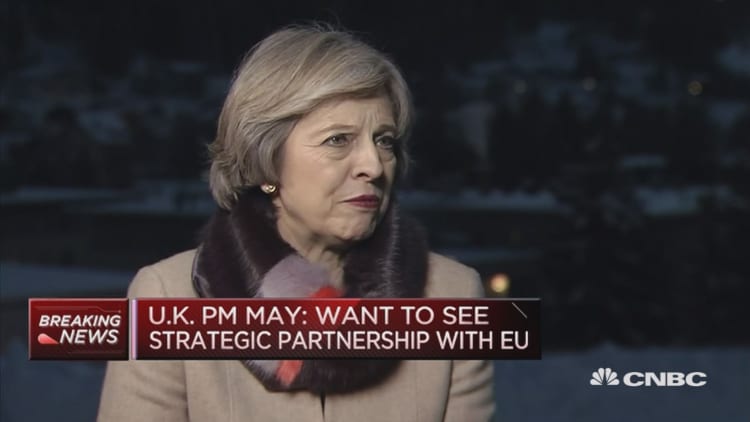The British economy showed no signs of losing momentum at the end of 2016, with a better-than-expected set of growth figures for the fourth quarter.
The U.K.'s gross domestic product rose 0.6 percent quarter-on-quarter in the three months to December, preliminary figures by the Office for National Statistics showed on Thursday morning, the same rate of growth as the previous two quarters. Analysts had been predicting a 0.5 percent rise for the fourth quarter.
The yearly rate also went above expectations, growing at 2.2 percent, in comparison to the consensus of 2.1 percent. However, growth overall slowed slightly to 2.0 percent in 2016, down from 2015's 2.2 percent, and 3.1 percent in 2014, ONS stated.
Ahead of the release, sterling touched a six-week high against the dollar, but came under slight pressure following the release, last standing around $1.2612 at 10.15 a.m. London time. Against the euro, the pound hit a three-week high shortly after the new numbers, while the FTSE 100 rose slightly.
The U.K.'s Finance Minister, Philip Hammond, said the latest GDP figures highlighted the "fundamental strength and resilience of the U.K. economy", according to a statement he released on Twitter. Hammond did however go on to state that some uncertainty could lie ahead as the country adjusts to its new relationship with its European counterparts.
"Today's U.K. GDP figures showed that the economy has entered this year in a strong position," Ruth Gregory, U.K. economist for Capital Economics, said in a note. Despite growth remaining "remarkably stable" following the Brexit vote, Gregory did go on to add that the balance of growth looked like it was set to shift during 2017.
Delving deeper into the figures, the services sector was seen as a key contributor to the growth figures, with there being a 0.8 percent quarter-on-quarter increase.
Manufacturing also delivered strong growth numbers, rising 0.7 percent. Meanwhile, production and construction output remained relatively flat, with the latter rising 0.1 percent.
The figures highlighted that growth remained resilient for the two quarters following the Brexit vote, however investors are expected to watch the U.K. and its data more closely in 2017, especially as the country is expected to trigger Article 50 in the coming months.

Last Tuesday, British Prime Minister Theresa May stated that she wanted the country to become "truly global" and while she hoped the U.K. would remain on good terms with its European partners, the country would be seeking a full departure from the EU's single market.
With a "hard Brexit" expected on the horizon, 2017 will be an interesting year to watch when it comes to U.K. economic data.
"Despite the economy's recent resilience, growth still looks set to slow in 2017 as higher inflation takes some of the steam out of household spending," Gregory added.
"That said, we don't expect the slowdown to be too severe. For a start, the strong end to last year provides a solid base for growth in 2017. What's more, while the adverse effects of the pound's fall have yet to be fully felt, the same goes for the beneficial effects too."


